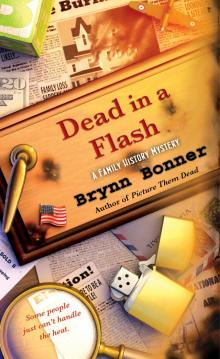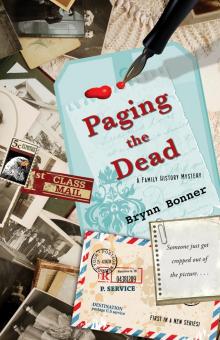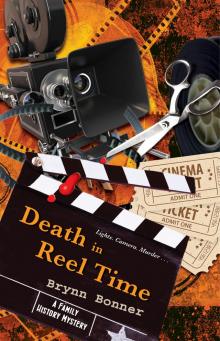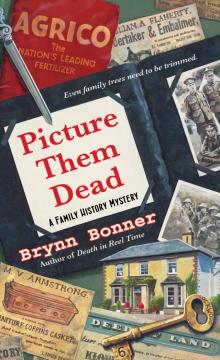- Home
- Brynn Bonner
Death in Reel Time Page 12
Death in Reel Time Read online
Page 12
“Winston came by to help me rearrange these shelves,” Marydale said, her words coming quick. She gestured to the hodgepodge shelving units that had grown up willy-nilly over every inch of wall space.
“They’re not efficient,” Winston said. “We’re trying to figure out what configuration works best.”
I looked from one to the other. Were they acting weird or was it just me? I pulled a chair over and out of the corner of my eye caught them exchanging a meaningful glance—meaningful to them, anyway.
Normally we share everything in our little club and I considered telling them about what I’d learned from Tina, but I knew Coco would probably tell Marydale at some point today and it was so sad and tawdry, I didn’t have the heart to rehash it at that moment.
“The order for Olivia is over here,” Marydale said, setting Sprocket down on the floor. He sniffed and went to curl up in his bed in the corner as Marydale pulled the package from a bin. “That’s one downside of rearranging. I know where things are now. I’ll have to learn a new system.”
“Change is good,” Winston said. “It’s just hard sometimes.”
I wasn’t sure the conversation was about shelves anymore. I took the package and stood to go.
“Hang on a minute, Sophreena,” Marydale said. “Something happened this morning and I’ve been debating what to do about it. Let me run it by you.” She motioned for me to sit back down. “You know Arlene Overton, right?”
I nodded, feeling a shiver of dread at the name. Arlene Overton was the poster woman for cranky, prudish, mean-spirited town gossips.
“I know, I know,” Marydale said, reading my face. “She came in this morning with her sister, Susan. Honestly those two should be in some kind of genetic study. Susan takes after their mother, who was the sweetest woman you’d ever want to know. Never had a bad word to say about anyone. But Susan must have sucked all that water right out of the gene pool, because Arlene didn’t get a drop of it. Anyhow, you know Arlene lives right next door to Beth and she was going on about why have the police not arrested that juvenile delinquent because she knows good and well that’s who killed Blaine Branch. How she has a mind to tell Sterling Branch or make a call to the State Bureau of Investigation to tell them the local police are botching things, or maybe contact a reporter or whatever.”
“And this juvenile delinquent is?” I asked, already knowing the answer.
“Tony,” Marydale confirmed. “Poor Susan kept trying to tell her she shouldn’t be accusing people without knowing all the facts, but Arlene went blathering right on. She swears she heard Tony’s motorcycle backfire that afternoon. She was grumbling that she’s been hearing it for weeks every time he rode up Blaine and Beth’s driveway and that it unnerved her because it sounded like a gunshot. So she knows Tony was at Blaine’s house the day he died. She said there was some kind of ruckus going on over there in broad open daylight and that it must have been Tony causing it, never mind that she can’t see a thing through the hedgerow between their houses. Anyhow, she claims she’s told the police and still they haven’t brought Tony in for questioning. Then she said—right out loud in front of a store full of customers—that she wouldn’t be surprised if Beth and the hoodlum were in on it together.”
“She’s nuts,” I said.
Marydale nodded. “Poor Susan was so mortified she hustled her out of the shop before I had a chance to throw her out, which I would gladly have done. The problem is, we know she’s a hateful old fishwife but not everybody does. So should I say anything about this to Denny? Would that make it better or worse for Tony?”
“I’ll talk to Denny about it if you want,” I said. “Arlene Overton may be a whack-a-doodle but if she’s got any useful info I’m sure Denny would want to know.”
“What about Tony?” Winston asked.
“Oh, I’ll definitely be talking to Tony,” I said.
thirteen
TONY WAS FILMING WITH ESME and Olivia when I arrived. Esme hadn’t warmed to the idea of the video scrapbook and had fussed about our having to arrange our schedule to match Tony’s. I was expecting her to be relieved I was there to take over. But it seemed somewhere along the way she’d discovered her inner ham.
“If we’re going to do these video scrapbooks with our clients I need to learn about it, too, Sophreena,” she said, patting her hair, which she’d done up in a complicated braid. She leaned in close to me as if she wanted to tell me something secret, but then I realized she was checking her makeup in the reflection of my glasses. “Do you know about this Ken Burns effect thingy?” she asked, slicking her pinky over her lips to freshen her gloss. She pointed to the scrapbook pages open on the table. “Tony sets it up so the camera pans over the pages while we’re talking about them and it gives the finished product movement and vitality,” she said, her hands indicating an undulating motion.
I turned to Tony. “What have you created?” I asked.
“A prima donna. But the camera loves her.”
“Okay, then,” I said. “I’ll just sit in the corner over here out of the way.”
“No, you’ll make me nervous, Sophreena,” Esme said, flashing me a silent message with her eyes. “Beth’s out on the porch. Why don’t you go visit with her while we finish up here.”
As I passed through the family room I saw a bouquet of beautiful roses on the side table. I tiptoed over to take in a whiff of their fragrance. Then I noticed the card and the snoop in me couldn’t resist. They were to Beth from Alan Corrigan. The card read Everything will be okay if we stick together. It seemed an odd condolence message, but who was I to judge? I never know what to say on those occasions.
Beth was sitting in a wicker chair with a quilt wrapped tightly around her, though the day was balmy for October. She was mesmerized by something in the yard but I didn’t see anything of interest. I spoke her name softly so as not to startle her and she turned, the movement in slow motion.
“Oh, hi, Sophreena,” she said. “I’m trying to remember. Why can’t I remember that day? I get little bursts,” she flayed out her fingers, “but then it’s gone and I can’t call it back. It’s so frustrating.”
“Would you like some company for a few minutes or am I disturbing you?”
“No, please,” Beth said, pointing to a twin wicker chair. “Will you be warm enough?”
“Yes, fine,” I said, looking down at my sweater and jeans, which were actually a little too toasty with the afternoon sun warming the space. I brushed at my black jeans. “I was holding Sprocket,” I said. “Normally he doesn’t shed so much; he must be overdue for a grooming.”
“They’re cute dogs,” Beth said, returning her gaze to the yard. “I always wanted a dog but Blaine says they make a mess and are too much trouble. He doesn’t want us to get one.” She frowned and pulled the quilt tighter around her. “He didn’t want me to get one,” she corrected.
“You know, Beth, sometimes the harder you strain to remember something the more elusive it becomes. What have you remembered about that day? Do you mind me asking?”
“No, I don’t mind,” Beth said, looking up at me as if surprised to find me there. “I just feel weird. It’s like I’m not processing things, or there’s some kind of delay. I don’t even know how Blaine got to the store that day. Or was he even at the store? Bonnie said she didn’t see him, so maybe he didn’t even go there. He had no car and he didn’t use mine, and his bike was still in the garage.”
I decided it wasn’t my place to divulge anything Tina had told me. And even if I had been free to tell her, I wouldn’t have relished the idea. Would Beth feel the loss less if she knew or would it double it? I went for a more innocuous question. “What was your regular Saturday morning routine? Maybe thinking of that will trigger something.”
“We usually sleep a little later than normal, then have an easy breakfast before Blaine goes off to play the sport of his choice: tennis, golf, sometimes fishing or kayaking, or maybe shooting at the range. I usually catch up on housework, t
hen craft or read or spend time with Mom.”
I noticed that she’d slipped into the present tense again and this time she didn’t correct herself.
“This might not work considering your memory problems are caused by your injury,” I said, “but there’s a technique I use with clients to help them remember names, dates, and events for their family histories. Would you like to give it a go?”
Beth hesitated, then nodded enthusiastically. “Yes, yes, I’ll try it. I’ll try just about anything at this point.”
“Okay, well, let’s start by having you get into a comfortable position, then we’ll do a relaxation exercise.” I took her through the drill, asking her to relax each part of her body and clear her mind, then slowly slid into questions. “Okay, so you’re waking up on Saturday morning. What do you see? What do you hear?”
“I see my bedroom, our bedroom. I look over but Blaine’s not there.” She frowned, then opened her eyes. “Oh, but I don’t know if that was Saturday morning. Maybe that was another morning.”
“It’s okay,” I said soothingly, hoping I could get her back on track. “Just close your eyes again and let it come to you. Now what do you hear? Is the radio on?”
“Mmmm,” Beth said, “yes, my clock radio, classic rock. Blaine likes heavy metal, which is horrible to wake up to, but his is off. There are voices, but not from the radio. They’re in our kitchen maybe. It’s a man and he’s saying something like ‘your time is up’ but real calm like maybe there’s a chess game going on. Blaine doesn’t like chess much but he plays with Alan sometimes. I think the voice was Alan.” She opened her eyes again. “Well, no, it couldn’t have been Alan. That would have been the day before. Alan had already gone back to Chicago by then.” She let out a huge sigh. “Thanks anyway, Sophreena, but this isn’t working.”
“Keep using the relaxation exercise on your own, Beth. Even if it doesn’t aid your memory it can help with stress.”
“I will,” she said, then surprised me by reaching over to give me a hug so fierce it squeezed the breath out of me and I wheezed like an accordion.
* * *
Esme was still upstairs getting dolled up when Denny arrived that night to take her to dinner. His eyes were bloodshot, he had a two-day growth of stubble, and he moved as if his shoes were made of lead.
“I take it the investigation is still stalled,” I said as he followed me to the kitchen and plopped down in a chair.
“You take it correctly,” Denny said. “Though stalled isn’t exactly the right word; let’s just say it’s proceeding at a glacial pace. I talked with Tina Gibson this afternoon. I wish she’d come forward sooner. It would have helped establish Blaine’s movements through the earlier part of the day. And I’m going to have a chat with Peyton Branch tomorrow. He never told me he was with his brother that morning.”
“Was he ever asked? I mean, with the shock of his brother’s death and the funeral and all, did anyone actually interview him?”
“Jennifer did,” Denny said. “She interviewed everyone in the Branch family. You don’t think she’d pass up a chance like that, do you? High-profile case, high-profile family? If she gets credit for a collar on this one it’ll be very good for her.”
“And very bad if she doesn’t, right? Bet she’s not getting much sleep, either.”
“Let me put it this way, I’m the pretty one right now,” Denny said, using his hands to frame his haggard face.
“Are you going to be able to keep Tina’s information confidential?” I asked.
“Confidential, no. I’ll do what I can but I couldn’t promise that. I felt sorry for her; she’s obviously ashamed and scared about what Mike will do if he finds out. But she made her bed—though if she’s to be believed, she didn’t lie in it.”
“Listen, Denny, I know I asked you this before, but are you sure Alan wasn’t in town that day?”
“Second time you asked me about him. What’s up?”
I told him about my talk with Beth. “The exercise wasn’t very effective, but for a moment or two it did seem like she was remembering. Probably nothing.”
“Probably,” he said, “but I’ll follow up on Corrigan all the same.”
Esme came down at that moment looking every inch the beauty, and with Esme that’s a lot of inches. Denny’s face brightened. He stood and kissed her on her proffered cheek and confirmed what she already knew, that she looked gorgeous.
“You said you’d pick the place,” he said. “Where are we headed?”
“We’re going to a little Thai place over in Chapel Hill for dinner. I want to get you out of town for a couple of hours so you can clear your head. Then after dinner we’re going for a massage, both of us.”
“A massage?” Denny asked. “I’ve never had a massage in my life.”
“Well, you’re getting one tonight,” Esme said. “I booked it, I paid for it, you’re going, and you’re welcome.”
“Esme,” Denny protested, “will I even fit on a massage table? In case you haven’t noticed, I’m a big guy.”
She gave him an up-and-down sweep of her eyes, then cocked her head. “In case you haven’t noticed, I’m not exactly Tinker Bell and I fit fine. But we will need to tip the masseuse generously.”
As Esme threw the end of her scarf over her shoulder and headed for the door, Denny turned back to me and whispered, “They may have to charge us by the acre.”
“I heard that!” Esme called.
* * *
I settled in to read more of Celestine Hargett’s diaries to pass the time before Jack arrived. He was bringing pizza and a movie. It wasn’t a date, and it certainly wasn’t on par with a massage, but it was something to look forward to nevertheless.
My heart raced a bit as I considered a massage and Jack in the same mix. I’d been struggling for a while now about how to get over crushing on him. It was silly. I gave myself the usual lecture about the value of true friendship over fickle romance, and part of me listened but the other part was still hung up on the massage thing.
I opened one of Celestine’s diaries and tried to put my attention back on life in the 1940s. I’d unrolled the timeline I was making for Olivia on the coffee table, letting it fall off each end and curl onto the floor. I located the section the diary covered in case I discovered anything that needed to be ticked in.
I hadn’t given up on finding out what happened to Olivia’s father, but I was getting discouraged. I was hoping I’d find something that might give me a lead. But, like Esme, I was also enjoying getting to know Celestine Hargett as she confided things about herself, like in the 1942 entry I was reading now:
I have not much time to write tonight for I am about to give out and will have to be up at early-thirty to get Riley off to his new job at the post office. I cannot begin to tell how relieved I am that he did not make it into the army. I am ashamed of that as I know he wants to do his duty and is really downhearted about them turning him down. And I know there’s others that are going willingly and plenty that don’t have any choice but to go. Maybe I feel a little like we are shirking by not making that sacrifice, but I can’t help how I feel. I just don’t believe I could go on through life without my Riley.
Johnny has told everybody for miles around that he will refuse to go even though he got his draft notice last week. And he makes no bones about it. He feels no sense of duty at all and says we’ve got no business over there to begin with and he’s not going to get himself killed for nothing. That makes Riley double-shamed as folks can now say one Hargett can’t go and the other one won’t go.
Paul Tillett, one of that big family of Tilletts from over around Murdock, rents our farmland and he has two sons, Robert and Raymond, who work it with him. Since they’re farmers both his boys could get exemptions but Robert is eighteen and has already signed up and Raymond wants to go so bad he can’t hardly stand it. He is not but fifteen and his mama says he’s just a boy and she will never sign for him to go. But there’s lots of boys around who are slipping
off and lying about their ages to get in. I hope she can keep him out as one son in peril is quite enough for a mother to bear.
Renny found a little feist dog down by the river yesterday. He was about half dead and had a string tied around his leg so it’s probably one somebody was trying to drown to get shed of it. Renny washed it and fed it warm milk and it’s looking a whole lot better, but Johnny says she can’t keep it. She begged him and was pitiful until finally he allowed as how she could keep it in the corncrib, but she wasn’t to let it in the house and she’s to keep it out from underfoot.
He’s a pretty little thing and we’re calling him Shoes. She called it something a little different at first and said it was Chinese for water, since she found him by the river. But Riley and me couldn’t pronounce it right. The little fellow has four black feet so we’ve all decided Shoes is a good name.
The dog has made Renny happier than I’ve seen her in a long while now and I do wish Johnny would let her keep the puppy with her but he is stubborn as a mule and purely strange about things when it comes to Renny. I don’t understand him. It is as clear as the nose on your face that he is plum crazy for her, but he turns down nearly about every chance to do little things that make her happy.
I remembered seeing a dog in the background of one of the family photos and made a note to scan, crop, and enlarge it and to ask Olivia if she’d known the dog named Shoes. I also made a note about Johnny Hargett having received his draft notice sometime before the date of the diary entry.
I had my laptop beside me on the couch and it made a whirring noise. I realized I still had the Crawford movie in the drive and reached over to pull the computer onto my lap.
Something was niggling at the back of my mind, but I couldn’t get hold of it. I clicked the video to play and watched as schoolkids paraded by in lockstep, girls skipped rope, and boys wrestled. Then the action cut away to the pool hall, where several swaggering young men gave James Dean squints at the camera, preempting the actual James Dean by a decade. Then there were two old men playing checkers. The board was set up on a barrel and the scene was fogged over with a haze of cigarette and pipe smoke. There was much Coke-drinking and watermelon-eating and tricks on bicycles and roller skates. Almost all the men wore hats: fedoras, panamas, baseball caps, porkpies, or farmers’ wide-brimmed straw toppers. They all seemed to need something to do with their hands when the camera turned on them. Some made a show of pulling a cigarette from the pack, or rolling their own; others checked their pocket watches or messed with their hair. One standout was a man who looked so old he could have been the captain of the Mayflower. He stepped toward the camera, definitely ready for his close-up, Mr. DeMille. A grin spread across his rubbery face, revealing not a single tooth, though he had a glorious handlebar mustache that commenced some impressive tilting and bouncing as he hammed for the camera.

 Dead in a Flash
Dead in a Flash Paging the Dead
Paging the Dead Death in Reel Time
Death in Reel Time Picture Them Dead
Picture Them Dead